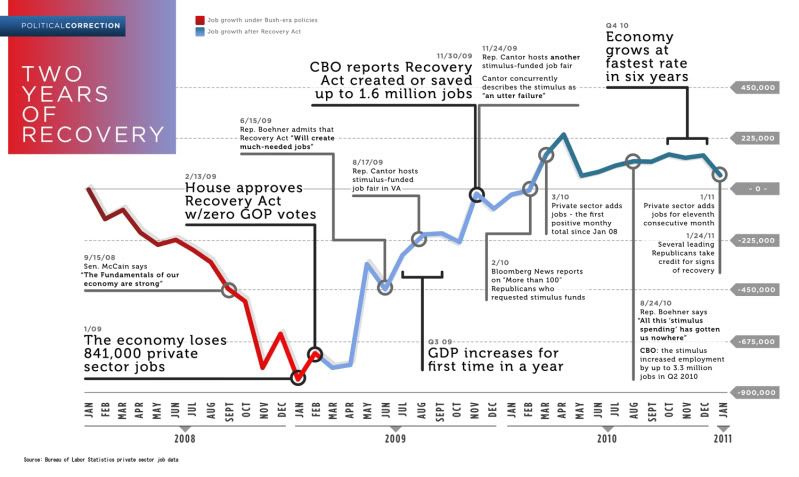
More here.
Last Thursday marked the two year anniversary of the passage of the Recovery Act. Michael Grunwald summarizes:
...the good news of the Recovery Act, which helped avoid a depression; reduced the unemployment rate by 2%; cut taxes for 95% of Americans; bailed out the states to prevent mass layoffs; funded more than 75,000 projects to upgrade roads, parks, sewers and just about everything else; and made unprecedented investments in renewable energy, health-information technology, broadband, the smart grid and much, much more — with no earmarks and virtually no fraud.
That summary begins to hint at why its so difficult to communicate how important the Recovery Act has been...its impact has been so far-reaching that its hard to put into a couple of sound bites.
Last fall, Grunwald wrote a fascinating article that focused on those unprecedented investments. Its a fascinating piece that digs a little deeper into this one area.
For starters, the Recovery Act is the most ambitious energy legislation in history, converting the Energy Department into the world's largest venture-capital fund. It's pouring $90 billion into clean energy, including unprecedented investments in a smart grid; energy efficiency; electric cars; renewable power from the sun, wind and earth; cleaner coal; advanced biofuels; and factories to manufacture green stuff in the U.S. The act will also triple the number of smart electric meters in our homes, quadruple the number of hybrids in the federal auto fleet and finance far-out energy research through a new government incubator modeled after the Pentagon agency that fathered the Internet...
The Recovery Act's clean-energy push is designed not only to reduce our old economy dependence on fossil fuels that broil the planet, blacken the Gulf and strengthen foreign petro-thugs but also to avoid replacing it with a new economy that is just as dependent on foreign countries for technology and manufacturing. Last year, exactly two U.S. factories made advanced batteries for electric vehicles. The stimulus will create 30 new ones, expanding U.S. production capacity from 1% of the global market to 20%, supporting half a million plug-ins and hybrids. The idea is as old as land-grant colleges: to use tax dollars as an engine of innovation. It rejects free-market purism but also the old industrial-policy approach of dumping cash into a few favored firms. Instead, the Recovery Act floods the zone, targeting a variety of energy problems and providing seed money for firms with a variety of potential solutions. The winners must attract private capital to match public dollars...and after competing for grants, they still must compete in the marketplace. "They won't all succeed," Rogers says. "But some will, and they'll change the world."
That's just a tidbit of what is in the article. I highly recommend reading the whole thing. The take-away is that the Recovery Act didn't just save us from the Great Depression (as important as that was). It also laid the groundwork for a sustainable future.




No comments:
Post a Comment